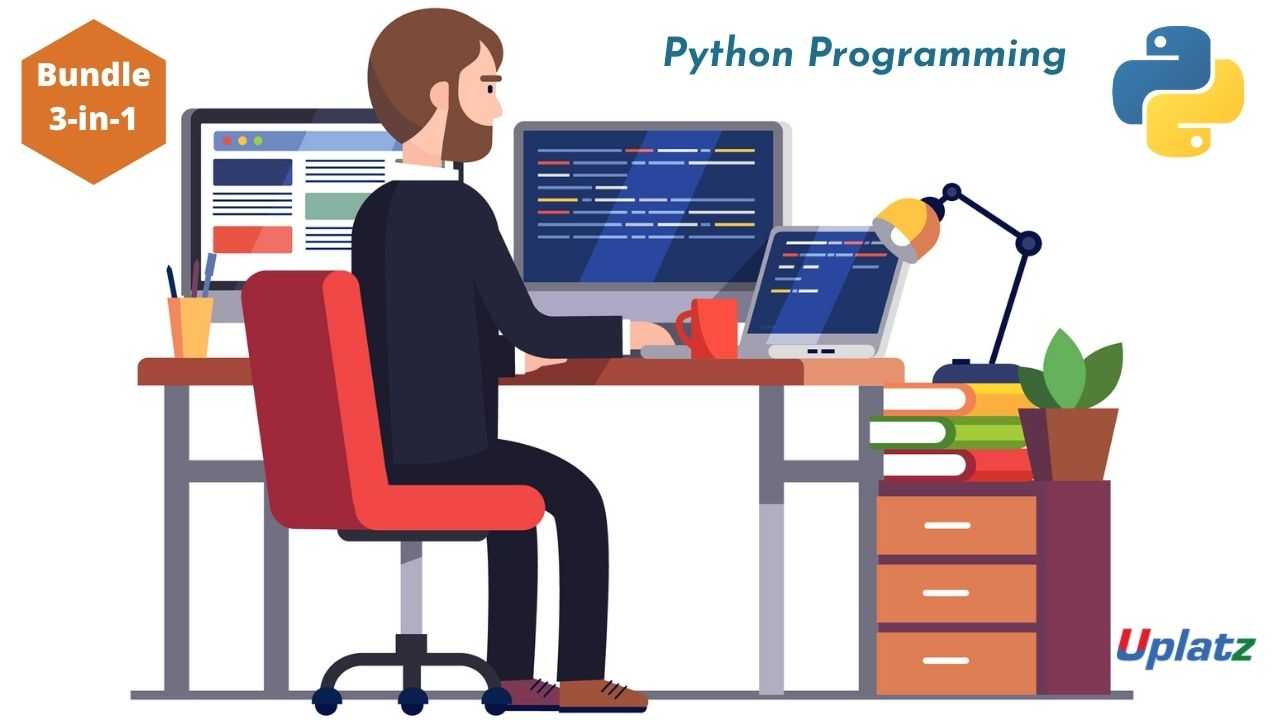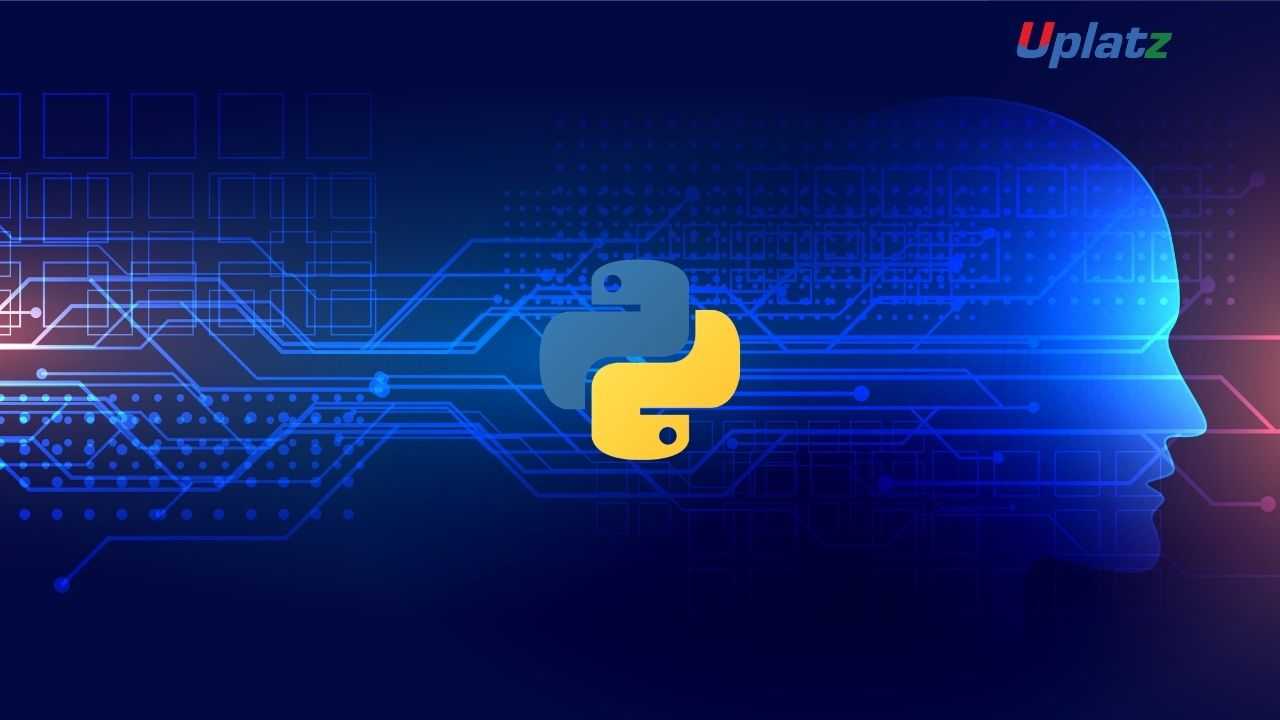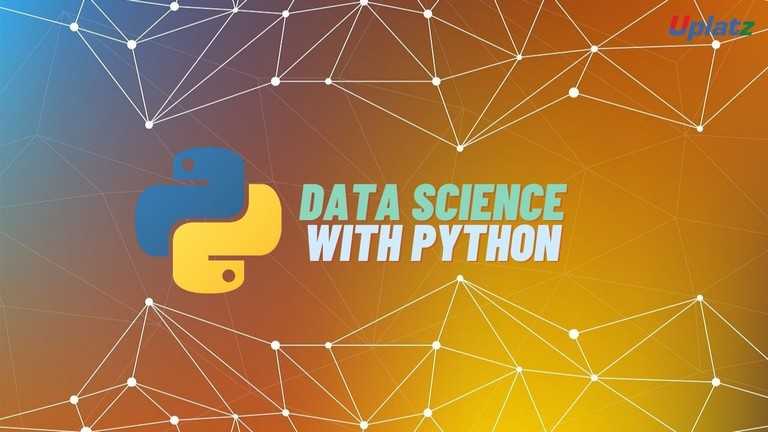Python Programming in a nutshell
Crash course on Python. Python basics to objects, functions, sequences, components, recursion, dictionary, GUI programming, NumPy, SciPy, web scrapingPreview Python Programming in a nutshell course
Price Match Guarantee Full Lifetime Access Access on any Device Technical Support Secure Checkout Course Completion Certificate 100% Started a new career
BUY THIS COURSE (
100% Started a new career
BUY THIS COURSE (GBP 12 GBP 29 )-
 95% Got a pay increase and promotion
95% Got a pay increase and promotion
Students also bought -
-

- Bundle Multi (4-in-1) - Python Programming
- 120 Hours
- GBP 22
- 3779 Learners
-

- Machine Learning with Python
- 25 Hours
- GBP 12
- 3518 Learners
-

- Data Science with Python
- 45 Hours
- GBP 12
- 2931 Learners

Python is a strong and easy-to-learn programming language. It offers efficient high-level data structures and an object-oriented programming technique that is simple yet effective. Python's beautiful syntax and dynamic typing, as well as its interpreted nature, make it an excellent language for scripting and quick application development across a wide range of platforms.
You'll study the foundations of the Python programming language, as well as programming best practises, in this course. You'll learn how to utilise Python data types and variables to represent and store data, as well as conditionals and loops to control the flow of your applications. To store groups of linked data, you'll use complicated data structures like lists, sets, dictionaries, and tuples. You'll develop scripts, define and describe your own custom functions, and handle failures. Finally, you'll learn how to utilise the Python Standard Library and other third-party libraries to identify and use modules. The official instructional may be found here. It covers all of the fundamentals and takes you on a tour of the language and standard library. For individuals who seek a short introduction to the language, this book is a good choice.
Course/Topic - Python Programming in a nutshell - all lectures
-
Episode 1 - Python Programming Introduction
-
Episode 2 - Numbers - Objects - Graphics
-
Episode 3 - Sequences - Lists - Strings - Files
-
Episode 4 - Defining Functions
-
Episode 5 - Decision Structures
-
Episode 6 - Loop Structures and Boolean
-
Episode 7 - Simulation and Design
-
Episode 8 - Defining Classes
-
Episode 9 - Data Collections
-
Episode 10 - Object Oriented Design - part 1
-
Episode 11 - Object Oriented Design - part 2
-
Episode 12 - Algorithm Design and Recursion - part 1
-
Episode 13 - Algorithm Design and Recursion - part 2
-
Episode 14 - Dictionary - Modules - File IO
-
Episode 15 - GUI Programming with Python
-
Episode 16 - Python in Nutshell
-
Episode 17 - NumPy and SciPy
-
Episode 18 - High Performance Components of Python
-
Episode 19 - Real-world Applications of Python - part 1
-
Episode 20 - Real-world Applications of Python - part 2
-
Episode 21 - Web Scraping with Python
Course outcomes
· The basic design cycle in computer science and programming: creating code, running it, analysing the results, and modifying the code syntax depending on the results.
· Use of variables, mathematical operators, logical operators, and Boolean arithmetic, which are the essential components of programming.
· Conditionals, loops, functions, and error handling are control structures for constructing dynamic applications, including Python libraries.
· Strings, lists, dictionaries, and file manipulation are the most important data structures for developing usable applications.
· Sneak peeks into the next major things in computer science, such as object-oriented programming and computer algorithms.
1. Python Programming Introduction
2. Numbers - Objects - Graphics
3. Sequences - Lists - Strings - Files
4. Defining Functions
5. Decision Structures
6. Loop Structures and Boolean
7. Simulation and Design
8. Defining Classes
9. Data Collections
10. Object Oriented Design - part 1
11. Object Oriented Design - part 2
12. Algorithm Design and Recursion - part 1
13. Algorithm Design and Recursion - part 2
14. Dictionary - Modules - File IO
15. GUI Programming with Python
16. Python in Nutshell
17. NumPy and SciPy
18. High Performance Components of Python
19. Real-world Applications of Python
20. Web Scraping with Python
1) What is Python? What are the benefits of using Python?
Python is a programming language with objects, modules, threads, exceptions and automatic
memory management. The benefits of pythons are that it is simple and easy, portable, extensible,
build-in data structure and it is an open source.
2) What is PEP 8?
PEP 8 is a coding convention, a set of recommendation, about how to write your Python code
more readable.
3) What is pickling and unpickling?
Pickle module accepts any Python object and converts it into a string representation and dumps it
into a file by using dump function, this process is called pickling. While the process of retrieving
original Python objects from the stored string representation is called unpickling.
4) How Python is interpreted?
Python language is an interpreted language. Python program runs directly from the source code. It
converts the source code that is written by the programmer into an intermediate language, which
is again translated into machine language that has to be executed.
5) How memory is managed in Python?
• Python memory is managed by Python private heap space. All Python objects and data
structures are located in a private heap. The programmer does not have an access to this
private heap and interpreter takes care of this Python private heap.
• The allocation of Python heap space for Python objects is done by Python memory
manager. The core API gives access to some tools for the programmer to code.
• Python also have an inbuilt garbage collector, which recycle all the unused memory and
frees the memory and makes it available to the heap space.
6) What are the tools that help to find bugs or perform static analysis?
PyChecker is a static analysis tool that detects the bugs in Python source code and warns about
the style and complexity of the bug. Pylint is another tool that verifies whether the module meets
the coding standard.
7) What are Python decorators?
A Python decorator is a specific change that we make in Python syntax to alter functions easily
8) What is namespace in Python?
In Python, every name introduced has a place where it lives and can be hooked for. This is known
as namespace. It is like a box where a variable name is mapped to the object placed. Whenever
the variable is searched out, this box will be searched, to get corresponding object.
9) What is lambda in Python?
It is a single expression anonymous function often used as inline function.
10) Why lambda forms in python does not have statements?
A lambda form in python does not have statements as it is used to make new function object and
then return them at runtime.
11) What is pass in Python?
Pass means, no-operation Python statement, or in other words it is a place holder in compound
statement, where there should be a blank left and nothing has to be written there
12) How can you share global variables across modules?
To share global variables across modules within a single program, create a special module. Import
the config module in all modules of your application. The module will be available as a global
variable across modules.
13) Explain how can you make a Python Script executable on Unix?
To make a Python Script executable on Unix, you need to do two things,
• Script file's mode must be executable and
• the first line must begin with # ( #!/usr/local/bin/python)
14) Explain how to delete a file in Python?
By using a command os.remove (filename) or os.unlink(filename)
15) Explain how can you generate random numbers in Python?
To generate random numbers in Python, you need to import command as
import random
random.random()
This returns a random floating point number in the range [0,1]









